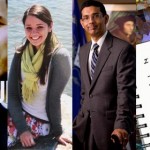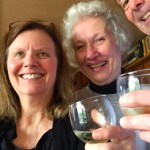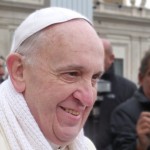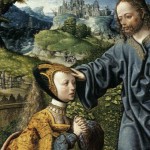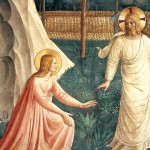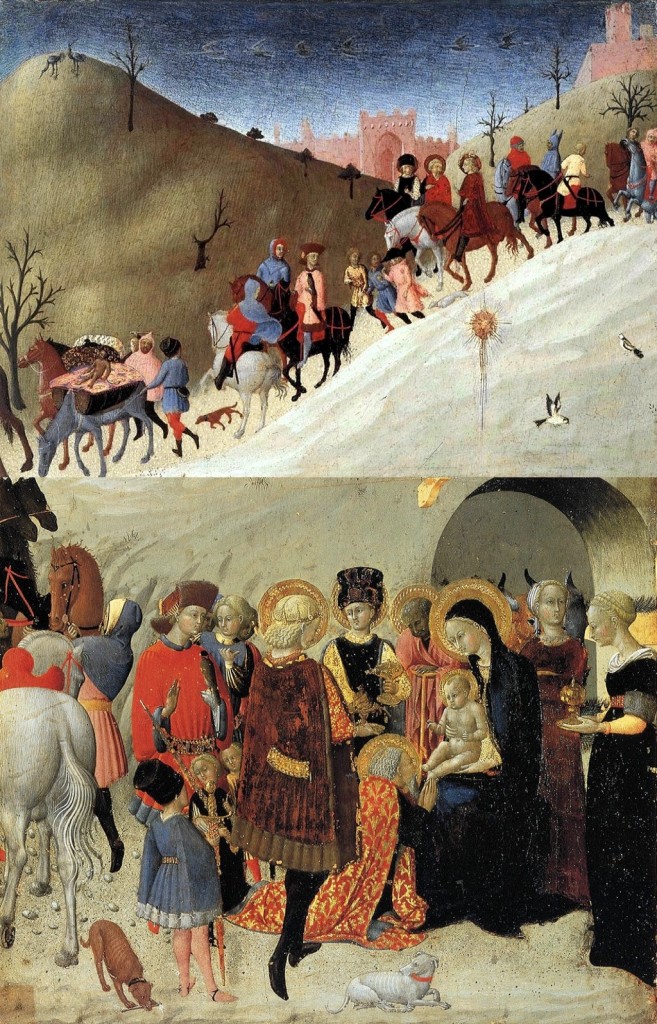
Sunday is the Epiphany. “Epiphany” means manifestation and in the Western Church it coincides with the story of the Magi ( Matthew 2:1-12) when the “world” recognized that Jesus was the Messiah. “Magi” is one of those words from the infancy narrative that is used by everyone but understood by few. Like “manger.” Magi were not really kings, wise men or astrologers — three common translations. It’s true the magi studied the stars for signs, which is the setup for this story, and their name gave us the English word “magic,” but they were not occultists; the magi were the priestly class of the Zoroastrian religion, the faith practiced by the Persians to the East. The deeper story here is that leaders of other religions recognized Jesus as being special.
I’m happy to be able to share this guest post, a lovely retelling of the story from the perspective of the magi, written by my friend Annie Turner. Whenever her text switches to italic, those words are drawn from scripture, Matthew 2:1-12. I hope you had a magical twelve days of Christmas!
It was a long journey. One I was not sure I would ever take again, for I am an older man, without the long and flexible legs needed to ride a camel for days and weeks and months.
Did I say it was a long journey? Did I say that we traveled through sandstorms, gritty dust, ice on the ground, and bare hills without anything green on them to relieve the eye? Did I say that we talked little among us — Caspar, Balthazar, and I, Melchior — intent only on our destination?
We had agreed to travel together because of our wonder at the star blazing in the sky. It called to us. Caspar was clear that we were being asked to journey afar. Balthazar was clear that we needed to bring gifts, as he said the star foretold the birth of a great king. I was clear about nothing, except that we must have good mounted camels to carry us the distance.
We ate hard bread, dried figs and water on the way. We slept wrapped in our cloaks, huddled beneath a small tent staked out. Our water was almost gone when we finally reached Jerusalem and, as a mark of respect, requested audience with King Herod.
Where is the one who has been born King of the Jews? We saw his star in the East and have come to worship him, I said, in a voice hoarse from thirst.
This king, who should have feted us with victuals and wine, strode off in a rage, calling to his men to gather the chief priests and teachers of the law… he asked them where the Christ was to be born. In Bethlehem in Judea, they answered.
I saw his face when he received this news. It crumpled in upon itself as if no light or smile could ever escape those tough wrinkles, and a smell emanated from him which I have scented once before, in battle. It was the metallic smell of hatred.
This king spoke to us again, asking about the time the star appeared; he requested we go to Bethlehem, find the child, and bring news so he could worship him too. But I knew those words were false. The lines on his face told me so.
We mounted our weary camels again and began the journey to Bethlehem, which was not far from Jerusalem. We had no trouble finding the stable for … the star… went ahead of us until it stopped over the place where the child was.
My knees buckled and I dropped to the ground. Of a sudden, I knew that was where I was meant to be — on my knees. I shuffled towards the stable door, knocked, and the man inside opened the door to us. Still kneeling, I approached the child wrapped in cloth, lying in the manger. He seemed asleep, but when I laid down my offering of frankincense before him, his eyes opened.
Had I ever seen eyes like those before? I could not tell if they were blue or almost black, they seemed so deep and wise like the eyes of an ancient king from the past. He waved a fist in our direction, and Balthazar fell to his knees also, spilling a casket of gold onto the earthen floor. I heard the mother gasp.
Then the child smiled, while Caspar laid down his gift of myrrh. Did I say it was a sad smile? How could that be in a babe so new? But I thought so at the time.
We did not stay; it did not seem right, although we had come such a long way to see this Savior. The woman, Mary, gave us some fresh bread and goat’s cheese to help us on our way, and we warned her of King Herod, who smelled of hate and intended harm to their child.
She snatched the baby Jesus up in her arms, holding him tightly to her chest, as Joseph, her husband, put his arm around her waist as if to protect them both.
I said, “We will go home by another way to avoid the king.” I did not say that in my dream all was red — a dream of blood and fear and loss.
Caspar and Balthazar touched the cheek of the babe briefly, then brought their fingers to their foreheads, bowing as we backed out of the door. Somehow I found myself atop my camel again, my friends beside me, and I turned the animal’s head towards the east to avoid Jerusalem. Looking back for the last time, I saw the star above the stable, lighting the path in which our animals walked home by another way.
— Ann Turner
Ann Turner is an essayist and widely published author of children’s and young adult fiction, most recently Father of Lies
(HarperCollins), a novel about the Salem Witch Trials from the viewpoint of a 14 year-old bipolar girl. Annie blogs about her faith journey at itsthegodthing.blogspot.com.


